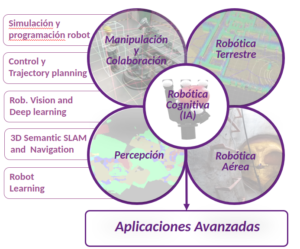
EURECAT
Web: https://eurecat.org
Web: https://eurecat.org/es/ambitos-de-conocimiento/robotica-y-automatizacion
Address: Av. Universitat Autònoma, 23, 08290 Cerdanyola del Vallès, Barcelona
Contact us:
Aeronautical sector commercial: Anton Gorostiaga ( anton.gorostiaga@eurecat.org )
Robotics and Automation Unit Manager: Daniel Serrano(daniel.serrano@eurecat.org )
Technological promoter of the Robotics and Automation unit: Jesús Pablo González(jesuspablo.gonzalez@eurecat.org)
Principal Investigator of the aerial robotics line: Julián Cayero ( julian.cayero@eurecat.org)
Who we are
Eurecat (www.eurecat.org) is the leading technology center in Catalonia and the second largest private research organization in southern Europe. Eurecat provides the business and industrial sector with differential technology and advanced knowledge to respond to the innovation needs of companies and boost their competitiveness. Likewise, in its desire to collaborate with other agents of the national innovation system, Eurecat establishes cooperation agreements and conventions with other centers that allow research and technological developments that require skills and equipment available in other centers to be carried out in a coordinated and advantageous way for companies. We are part of 22 technology platforms, 12 Digital Innovation Hubs and 37 European associations.
The following is a summary of the center’s most significant figures:
| Template | > 650 people | Annual revenues (M€) | 52 |
| Parity (M/H) | 42% / 58% | Headquarters | 11 |
| Customers | >1700 | Spin-off | 8 |
| Patents | 153 | R&D consortium projects | > 200 |
| H2020 Projects (2014-2021) | 118 | Projects led in H2020 | 33 |
The technological specialization of the center is divided into four technological areas: Industrial, Digital, Biotechnology and Sustainability. As a whole, they have a high degree of knowledge and expertise in more than 20 scientific and technological fields, including: artificial intelligence, cybersecurity, advanced manufacturing, intelligent materials, printed electronics, robotics and automation, medical devices, circular economy, climate change, nutrition and health.
The robotics and automation team works on research and development of solutions in the fields of mobile and industrial robotics. The unit focuses its main interests on improving and increasing the reliability of autonomous systems operating in realistic scenarios, as well as the development of new applications. In the last 15 years, the unit has executed more than 125 research projects, including European (20), national (20) and private projects focused on technology transfer.
Main lines of research
The Robotics and Automation Unit channels its activities into five main areas that work flexibly and jointly for the research and development of advanced solutions in applications related to industrial and service robotics in multiple sectors.
Main R&D&I projects
The most outstanding projects related to the aerial robotics research line are presented below.
Awards and recognitions
- Three international awards from the IEEE Robotics and Automation Society (RAS) in 2016 during euRathlon participation:
- Best Innovation on the UAV Domain
- Best Autonomy Award and
- Best Multi-Robot Coordination Award
- The first legal drone flight in Brusels during the European civil protection forum DG_ECHO in 2015
Services offered
The catalog of the robotics unit extends into each of the aforementioned lines of research. Below are only the services related to the aerial robotics branch.
- Tailor-made developments for aircraft onboard intelligence integration
Integration of perception, control and navigation algorithms to increase the dexterity and autonomy of aircraft with autonomous flight capabilities. Oriented to drone operators and platform developers.
- Proof-of-concept and turnkey development for end-users
Implementation of proofs of concept, technology evaluation and customized developments to solve customer problems. Targeting transferable and licensable products for direct exploitation by the end user or third parties.
- Design support and component selection
Platform design support service, actuator sizing, sensor selection and integration as well as on-board systems. Oriented to manufacturers or platform developers.

